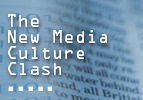



I focused my research on new media opportunities at ODU and my discussion here on graduate courses because I believe that graduate students can be the key entry point for the new media chicken-and-egg cycle. Once introduced to digital arguments, they present the most viable option for change. Due to the proliferation of digital composition technologies, current and future graduate students are more likely to have higher levels of computer experience and less inclined to resist technology. During their studies they can be exposed to both new media scholarship and scholarship about new media while being provided an opportunity to produce digital scholarship of their own.
Because graduate students are identifying and developing their areas of expertise, early exposure to consumption and production of digital scholarship offers a decreased likelihood of resisting multimodal composition. Additionally, doctoral students often are teaching undergraduate courses during their training. Because they do not have long pedagogical histories to rely on, they are more likely to integrate digital, multimodal compositions into undergraduate classes broadening campus exposure to new media. After all, it is much easier to “get outside the box,” when your box has not yet been fully constructed.
The final reason I believe graduate students are particularly critical lies in the nature of the relationship between faculty member and student. The more collegial mentoring relationship between faculty and graduate students facilitates a more open discussion of the nature of digital scholarship and allows for a better negotiation of what kind of digital media would be acceptable to meet course requirements. After all, graduate students often have encountered more scholarly publications than undergraduates who typically encounter mainly textbooks or lectures. This relationship is especially important given the fear-based issues impeding wider acceptance of digital scholarship.
Meta-literacy & multimodal pedagogy • A focus on graduate students • Interview methodology • Works cited • Home